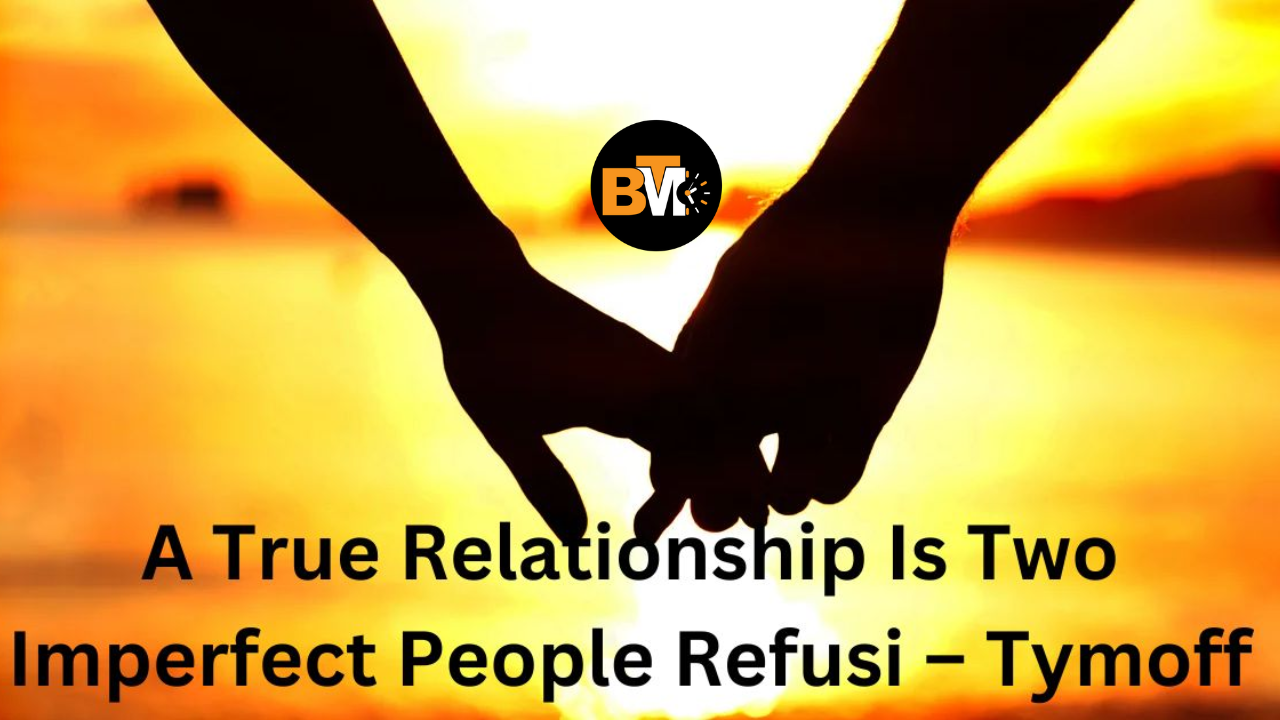A true relationship is two imperfect people refusi – tymoff. A perfect union where everything fits into place is a common representation of a true partnership. But this romanticized picture is not at all what reality is like. Fundamentally, a genuine relationship consists of two flawed individuals who persevere in supporting one another while a true relationship is two imperfect people refusi – tymoff navigating life’s challenges. It’s about fortitude, comprehension, and a strong resolve to meet life’s obstacles as a team. Exploring resilient relationships, the post illustrates how flaws fortify bonds, enhancing resilience and intimacy in romance.
Understanding Imperfection in Relationships
Acknowledging and embracing faults is crucial on the path of love. This insight typically emerges as the novelty of a new relationship fades and exposes each partner’s true self, testing the relationship’s strength.
Acceptance goes beyond tolerating faults; it’s deeply understanding that nobody, including ourselves, is flawless, fostering compassion. This acceptance creates the space for an open sharing of vulnerabilities in a more genuine, unconditional relationship.
Accepting imperfections builds trust and empathy, forming the cornerstone of a resilient relationship between couples. Through this a true relationship is two imperfect people refusi – tymoff process, we encourage idealized expectations to yield to a more grounded and accepting view of partnership. Our goal is to create a loving and supportive bond despite the flaws that make each of us unique.
The Art of Communication: Navigating Through Misunderstandings
Resolving miscommunications in a partnership is a delicate but essential part of keeping a solid bond. The foundation of this process is effective communication, which emphasizes how important it is for both parties to be honest about their feelings, thoughts, and worries.
Communication entails active listening, where both genuinely strive to understand each other’s perspectives, fostering impartial comprehension. This method creates a secure space where problems can be discussed productively without worrying about being judged.
It also involves finding common ground, appreciating differences, and knowing when to say “yes” to disagreements. In addition to resolving disputes a true relationship is two imperfect people refusi – tymoff, this kind of communication builds the understanding and trust between parties, both of which are essential for a strong partnership.
The Role of Forgiveness in Healing and Growth
In the development of a genuine connection, forgiveness is a transformational experience. Forgiveness isn’t solely releasing bitterness; it’s embracing healing, allowing both to progress and grow individually.When partners choose to forgive one another, they are consciously choosing not to let old grudges control their relationship a true relationship is two imperfect people refusi – tymoff going forward.
This crucial step fosters closer, mature connections, allowing individuals to glean vital lessons from their experiences together. Forgiveness creates a space where trust and honest communication can grow, which is essential for overcoming the inescapable difficulties that couples inevitably encounter.
It fosters empathy and understanding, two attitudes that are necessary for a strong and long-lasting relationship. Couples ensure their relationship centers on their commitment to grow and improve together, prioritizing forgiveness over dwelling on mistakes.
Supporting Each Other’s Dreams and Aspirations
A genuine connection is demonstrated by the degree of support each other provides for each other’s goals and desires. It entails gladly embracing victories and steadfastly offering assistance and motivation in the face of setbacks. When one partner has a desire, the other pursues it together; it’s a journey based on respect and admiration for each other as well as separate aspirations.
With robust support, they inspire all to chase goals and dream bigger, fostering an empowering dynamic. It’s about genuinely listening to one other’s goals and offering helpful criticism that inspires action.
Through support in hardships and shared joy in triumphs, relationships deepen, showcasing love beyond individual achievements to mutual support. This reciprocal support is a strong force that may propel each person toward realizing their full potential and turning the pursuit of ambitions into a shared narrative chapter.
Keeping the Spark Alive: Nurturing Intimacy and Passion
Cultivating intimacy and desire is essential to a relationship’s longevity. To do this, deliberate action and a dedication to always finding each other again are needed. Engaging in long, uninterrupted conversations, organizing surprise dates, or a true relationship is two imperfect people refusi – tymoff discovering new hobbies together are all effective ways to rekindle a flame that may have faded over time.
Express care to your partner through encouragement, acts of service, or physical touch, reinforcing affection and connection. A potent reminder of the love you share can also be obtained by revisiting treasured locations or going through old pictures.
Sustaining marital spark entails daily gestures, affirming love and desire through small, consistent expressions of affection. You build a strong bond that is fueled by love and gratitude for one another when you proactively invest in the passion and closeness of your relationship.
Embracing Change Together: The Key to a Lasting Bond
Navigating change tests a relationship’s resilience, revealing its strength and depth through adaptation and growth together. Couples have the chance to develop as a team and as individuals when they decide to accept these changes together. This could entail adjusting to major life changes like changing jobs, moving, or growing a family.
Couples strengthen their sense of connection and purpose by tackling these changes together. It promotes honest dialogue that allows worries and hopes to be freely shared, resulting in support and understanding amongst people. As a result of learning to compromise and adjust tactics that strengthen their relationship, couples who use a collaborative approach to change also develop their problem-solving abilities.
Facing life’s little adjustments or big events together helps them believe that they can rely on one another no matter what the future brings. This flexibility makes their relationship more robust and long-lasting by fortifying their relationship and equipping them for obstacles to come.
The Power of Teamwork in Overcoming Challenges
Facing life’s obstacles together with a partner turns barriers into shared challenges, highlighting the essence of teamwork. This collaborative mindset involves approaching issues together and leveraging each other’s strengths to devise superior solutions than individually possible.
It’s about helping one another out when things become hard, supporting one another, and pushing one other to keep going. When couples work together to overcome obstacles, they also learn to trust and rely on each other more because they see each other’s resilience personally.
Partnership strengthens overcoming challenges, solidifying trust and the assurance of a steadfast friend in each other. This cooperative strategy not only lessens the burden of obstacles but also recognizes and acknowledges all of their accomplishments as joint venture successes.
Celebrating the Journey: Reflecting on Shared Experiences
Honoring the path of a relationship requires reflection on shared experiences. It gives couples a chance to stop and reflect on their journey together, enjoying the good times as well as the difficulties they’ve surmounted.
Reflecting isn’t mere hindsight; it validates the relationship forged through shared trials, victories, and growth. Spending time remembering these times can rekindle emotions of love and gratitude, strengthening the bond between partners.
Couples cherish the depth nurtured through shared experiences, acknowledging personal and joint growth, fostering gratitude and recognition. By remembering the fortitude, camaraderie, and steadfast support that shaped their journey together, thinking back on their common experiences helps to illuminate the future with optimism and a common goal.
3 FAQs About – A True Relationship Is Two Imperfect People Refusi – Tymoff
Q: “A true relationship is two imperfect people refusing to give up on each other”—what does this mean?
A: Real relationships involve mutual devotion despite recognizing personal and partner flaws, reflecting genuine commitment and acceptance. They work through challenges together rather than walking away, valuing their bond over the imperfections each person brings.
Q: How can imperfections in a relationship actually strengthen the bond between partners?
A: Imperfections allow for growth, understanding, and deeper connection. When partners navigate through their flaws together, they develop empathy, improve communication, and build a robust foundation of trust. This process transforms vulnerabilities into strengths, solidifying the partnership.
Q: Can a relationship still be passionate and intimate in spite of its flaws?
A: Absolutely. Sustaining passion demands joint effort: embracing change, fostering communication, and supporting each other’s dreams intentionally. Intimacy blossoms with ongoing investment, exploring fresh connections and love amidst the beauty of everyday imperfections.
Final Thoughts To – A True Relationship Is Two Imperfect People Refusi – Tymoff
In summary, a genuine relationship persists despite faults, rather than allowing them to break the connection. Dedication’s strength shows in mutual learning, empathy, and the relentless pursuit of understanding among us. Authentic bonds thrive on embracing imperfections, fostering closeness, and viewing flaws as opportunities for deeper connection.
In every trial and triumph, partners reaffirm dedication, proving enduring love thrives on shared courage in adversity. In this light, we come to appreciate that true strength in a relationship emanates from the heart’s capacity to love, not despite imperfections, but because of them.





